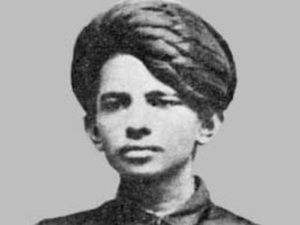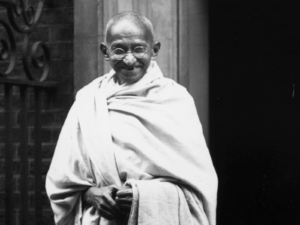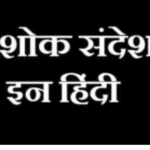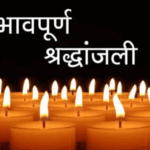Now Reading: Shradhanjali to Mahatma Gandhi
-
01
Shradhanjali to Mahatma Gandhi
Shradhanjali to Mahatma Gandhi

Shradhanjali to Mahatma Gandhi—Life, Legacy & Lessons
Introduction:
This page is an offering of Shradhanjali homage to Mahatma Gandhi’s life and thought. An offering to that soul from whom the principles of satyagraha, ahimsa, and social reform have transformed a nation and inspired the world. Here, you will find the full biography, alongside details about the highlights of his struggle, beliefs, and impact.
Early Life & Formative Years
Birth and Family Background
Mohandas Karamchand Gandhi was born on October 2, 1869, in Porbandar, Gujarat, into an orthodox Vaishnavite Hindu family, influenced also by Jain principles of non-violence.
Education in London
At 19, he left for London to study law at the Inner Temple. The experience started inauspiciously, but it later brought him some salvation. In the company of fellow vegetarians in the Vegetarian Society, he rubbed shoulders with such illustrious names as Tolstoy and Annie Besant.
Awakening in South Africa
The inhumane expulsion of Gandhi from a first-class compartment in a South African train with a valid ticket became a watershed moment in his Black rights activism, an experiment with peaceful resistance, and the founding of a theory of nonviolent resistance characterised as satyagraha—holding fast to truth.
Return to India: Leader of Freedom
The Champaran Satyagraha (1917)
The Champaran Satyagraha, in Bihar, was the first major campaign in India led by Gandhi, who agitated for impoverished indigo farmers suffering under the landlord system. The extensive success that he achieved with the local populace set the tone for organised mass movements in India.
Sabarmati Ashram and Constructive Action
Established in 1917 in the city of Ahmedabad, the Sabarmati Ashram became the site of a self-sufficient settlement cultivating manual labour, literacy, and self-reliance. From here, Gandhi launched the historic Dandi Salt March in March 1930.
Salt March and Civil Disobedience Movement
The Salt March, or Dandi Satyagraha (from March 12 to April 6, 1930), involved Gandhi and 78 associates in marching 387 km to produce salt illegally in an act of defiance, launching mass civil disobedience and global attention to India’s fight for freedom.
Quit India Movement (1942)
This movement was about calling for immediate British withdrawal. Gandhi and many Congress leaders were arrested, but it was nevertheless a crucial turning point in the struggle for India’s independence.
Philosophy & Beliefs
Satyagraha Essence and Non-violence
Satyagraha is based on moral conviction in adopting a form of non-violent resistance. It was practiced in South Africa (around 1906) for the first time and thereafter influenced the Indian national movements for many decades.
Moral Power of Fasting
The fasts served as tools to arouse public opinion and influence the colonial rulers during the colonial struggle, as was the case in 1932 over the separate electorates for Dalits, as well as during his imprisonment in 1943.
Social Reforms: Women, Untouchability & Education
Gandhi condemned caste discrimination, dowries, child marriages, and purdah in the name of women’s rights, yet his ideas again show the ideas that were prevalent at that age when it came to gender.
Legacy & Influence
Globally, impact
Gandhi’s life influenced leaders like Dr. Martin Luther King Jr., Nelson Mandela, and even Barack Obama, presidents of the United States, who publicly acknowledged his ideals (Le Monde.fr).
Nobel Peace Prize—Never Awarded
Although nominated several times (1937, 1938, 1939, 1947), he never received the Nobel Peace Prize. It later regretted the omission, expressed by the larger committee itself.
Must-See Places
Sabarmati Ashram, Ahmedabad: venue of daily prayers, community life, and the launch of Dandi
Mani Bhavan, Mumbai: Gandhi’s home (1917-1934) is now a museum preserving his letters, personal belongings, and charkha.
Martyrdom and Remembrance
The Assassin’s People
On January 30, 1948, Gandhi was shot dead by Nathuram Godse at Birla House in New Delhi at 17:17 hours IST. The trial followed hard on the heels of that, with Godse and co-defendant Apte executed in November 1949.


Shaheed Diwas (Martyrs Day)
On January 30 every year, Shaheed Diwas is observed in India. Top leaders pay tribute at Raj Ghat, Delhi’s memorial to Gandhi, in a two-minute silence observed nationwide.
Why Gandhi Still Matters
-
Non‑violence and civil resistance remain relevant as tools of moral protest.
-
His constructive programs and promotion of local economies anticipate ideas in sustainability.
-
His emphasis on truth, self‑discipline, and ethical leadership offers lessons in personal responsibility.
-
The continued global recognition, including the United Nations declaring his birthday (Oct 2) as the International Day of Non‑Violence (2007)
Closing Thoughts
This Shradhanjali pays tribute to Mahatma Gandhi not merely as a historical figure but as an eternal beacon of truth, non-violence, and ethical leadership. We wish that readers would reflect upon the relevance of his life lessons in personal growth, sustainable living, or global justice.
Do tell if you would like assistance in expanding any part or sourcing images, such as at Mani Bhavan, or integrating quotes and links for full-length content.






